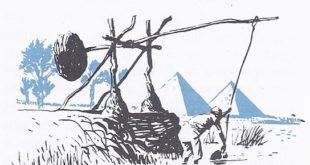Now Hiram, King of Tyre, sent his servants to Solomon, when he heard that they had anointed him King. . . And Solomon sent word to Hiram, “ . . . I purpose to build a house for the name of the Lord my God. . . Now therefore command that cedars of Lebanon be cut for me; and . . . I will pay you for your servants such wages as you set; for you know that there is no one among us who knows how to cut timber like the Sidonians [people of the city of Sidon].” . …
Read More »Our World has Roots in the Distant Past
The Growth of Egyptian and Mesopotamian Civilization
People satisfy their important needs in different ways. For example, most of you obtain water merely by turning on a faucet in your home. The water is pumped from large reservoirs and piped considerable distances before reaching your home. Many however, get water from wells. The water is raised in a variety of ways — by pumps operated by hand, by windmills, by gasoline engines, or by electric motors. In earlier times the well sweep, or pole with a bucket at one end, was often used. If you should travel along Egypt’s Nile River today, you might see a farmer …
Read More »Man’s Long Road Up From Savagery
Perhaps you have asked yourself, “What would I have done?” as you have read an adventure yarn or the true story of some person set down in a wild and remote spot. One of the most famous stories in the English language recounts the adventures of’ Robinson Crusoe, who was shipwrecked and cast ashore on an uninhabited island. Crusoe was completely alone and had only the few materials which he saved from the wreckage. With these and with what he found on the island, Crusoe had to provide his own food and shelter. Days and even weeks were required to …
Read More »

